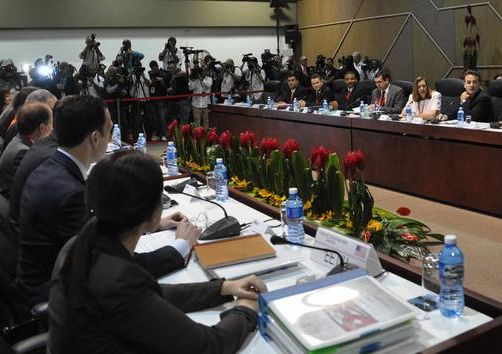 Delegations from Cuba and the United States held two days of official talks in Havana, in which they discussed issues such as illegal immigration and the course towards the restoration of diplomatic relations.
Delegations from Cuba and the United States held two days of official talks in Havana, in which they discussed issues such as illegal immigration and the course towards the restoration of diplomatic relations.
Cuba Issues Statement on Migratory Talks with the US
Cuba and US Discuss Re-establishment of Diplomatic Relations
With extensive media coverage of national and international media, the negotiations, held at the Havana’s Conference Center, were based on the will expressed about the presidents of the two countries on December 17.
According to Cuban authorities, the great obstacle towards the approach the two governments want is the economic, commercial and financial blockade Washington has maintained against Cuba for more than 50 years.
But, despite the deep differences between both sides, spokespeople from the two delegations described the negotiations as positive, constructive and flexible.
However, both delegations said this is the beginning of a long process.
As part of this plan, the 28th round of immigration talks between Cuba and the United States was held on January 21.
In this phase, the U.S. delegation was presided over by Deputy Assistant Secretary at the U.S. State Department’s Bureau of Western Hemisphere Affairs, Edward Alex Lee.
The official expressed publicly his satisfaction for the results of exchanges, and reiterated Washington’s traditional position to maintain in force the Cuban Adjustment Act, in force since 1996, and the wet-foot, dry-foot policy.
On the other hand, the director general of the United States Division at the Foreign Ministry, Josefina Vidal Ferreiro, who headed the Caribbean island’s representation, stressed that these regulations confer exclusive benefits to the Cubans and are the main incentives for illegal immigration into the northern country.
The talks about the process to restore diplomatic ties and the embassies in the respective capitals, which according to the two delegations will need enough time to resolve a series of legal and logistic obstacles, were carried out on January 22.
In that meeting, the U.S. delegation was headed by Roberta Jacobson, United States Assistant Secretary of State for Western Hemisphere Affairs, while Josefina Vidal led the island’s representation.
In many contacts with the press, spokespeople from the two delegations coincided that those steps should be based on the principles of international law, the United Nations Charter, and the Vienna Convention on Diplomatic and Consular Relations.
After concluding this session yesterday’s afternoon, Vidal said history has shown that Cuba has never responded or will respond to pressures from nowhere.
The statement was made responding a release the U.S. delegation delivered to the press, ensuring that the U.S. representation pressed the Cuban delegation on the issue of human rights in talks.
The Cuban official expressed the evident contradiction existing between the process towards the renewal of diplomatic relations between Cuba and the United States, and the fact that Washington maintains the Caribbean island in the list of countries that according to the White House sponsor terrorism.
 Escambray ENGLISH EDITION
Escambray ENGLISH EDITION





Talking is good. Diplomacy is good. Conflict is not about differences. Conflict is about power. The differences in Cuba and US can be brought to mutual agreement if the US and Cuba do not impose power in the discussions.
My advice to the Cuban people, the Cuban government is not to trust the current American administration. Perhaps wait for the next administration in January 2017.